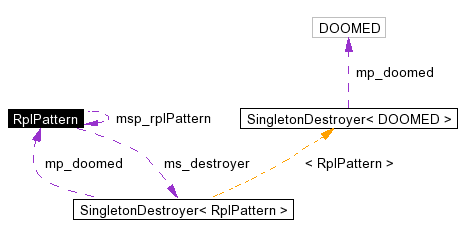RplPattern Class Reference
Reads in the pattern file and applies the traceString when replace is called.
More...
#include <rplPattern.h>
Collaboration diagram for RplPattern:
 [legend]List of all members.
[legend]List of all members.
|
Public Member Functions |
| | ~RplPattern () |
| void | replace (Tbl &dict, std::string &ts, std::string &leadwspc) |
| | Place trace strings at the beginning of routines.
|
| void | replace (Tbl &dict, std::string &ts, std::string &leadwspc, std::string &rtnStr) |
| | Place trace strings at the end of routines.
|
Static Public Member Functions |
| static RplPattern & | instance () |
| static void | build () |
Private Types |
| enum | ListType_t { NONE,
ACTIVE,
INACTIVE
} |
| | What type of routine list.
|
Private Member Functions |
| | RplPattern () |
| | Read in pattern file and routine list if requested.
|
|
| RplPattern (const RplPattern &) |
| | Users can not copy one.
|
|
RplPattern & | operator= (const RplPattern &) |
| | Users can not assign one.
|
| void | findPattern (Tbl &tbl, std::string &ts, std::string &pat) |
| void | buildPatternTbl (std::string &line, Tbl &tbl) |
| void | add2dict (std::string &args, Tbl &tbl) |
| void | buildList (ListType_t listType, const char *fn) |
Private Attributes |
| Tbl | m_startPatternTbl |
| Tbl | m_endPatternTbl |
| STD(set)< std ListType_t | m_listType |
| | This holds the type of routine list.
|
| int | m_remove |
Static Private Attributes |
| static RplPattern * | msp_rplPattern = 0 |
static SingletonDestroyer<
RplPattern > | ms_destroyer |
Detailed Description
Reads in the pattern file and applies the traceString when replace is called.
- Description
- The class is reponsible for several things:
-
It must read in the pattern file saving away start and possible end patterns.
-
It saves away a list of either active or inactive routines.
-
It applies the start and possible end patterns.
Constructor & Destructor Documentation
|
|
Simple dtor: all member data, no pointers. |
| RplPattern::RplPattern |
( |
|
) |
[private] |
|
|
|
Read in pattern file and routine list if requested.
- Description
- Find the pattern file, open it then read each line and remove any comment lines. Then place patterns in either the start or end. All pattern go into the start list unless told otherwise.
|
Member Function Documentation
| void RplPattern::add2dict |
( |
std::string & |
args, |
|
|
Tbl & |
tbl |
|
) |
[private] |
|
|
|
If the traceString has a brace list then add it to the dictionary. |
| static void RplPattern::build |
( |
|
) |
[inline, static] |
|
|
|
Build a the pointer and register in with the destroyer. |
| void RplPattern::buildList |
( |
ListType_t |
listType, |
|
|
const char * |
fn |
|
) |
[private] |
|
|
|
Read in the list of active/inactive routine names. |
| void RplPattern::buildPatternTbl |
( |
std::string & |
line, |
|
|
Tbl & |
tbl |
|
) |
[private] |
|
|
|
Add a key value pair to the pattern tbl, stripping any leading or trailing blanks. |
| void RplPattern::findPattern |
( |
Tbl & |
tbl, |
|
|
std::string & |
ts, |
|
|
std::string & |
pat |
|
) |
[private] |
|
|
|
Use the input traceString in ts to find the name of the pattern to use. If there is none then use the default pattern by asking what defaultPatName() is.
If there is no pattern by that name then report a warning and continue. |
| static RplPattern& RplPattern::instance |
( |
|
) |
[inline, static] |
|
| void RplPattern::replace |
( |
Tbl & |
dict, |
|
|
std::string & |
ts, |
|
|
std::string & |
leadwspc, |
|
|
std::string & |
rtnStr |
|
) |
|
|
|
|
Place trace strings at the end of routines.
- Description
- This routine does several things:
-
If the endPattern file is empty then it returns.
-
It returns if the routine is not active.
-
It modifies dict if there is something placed in the codes traceString
-
Then it generates the traceString and places in the output.
|
| void RplPattern::replace |
( |
Tbl & |
dict, |
|
|
std::string & |
ts, |
|
|
std::string & |
leadwspc |
|
) |
|
|
|
|
Place trace strings at the beginning of routines.
- Description
- This routine does several things:
-
If --name is requested by the user then the fully qualified name is written to stderr and the routine returns.
-
It checks to see if the instrumentation should be added by checking to see if the routine is active by checking if or how the routine is on the list. It returns if not active.
-
It modifies dict if there is something placed in the codes traceString
-
Then it generates the traceString and places in the output.
|
Member Data Documentation
|
|
The (possibly empty) table of end patterns |
|
|
This holds the type of routine list.
- See also:
- m_routineList}
|
|
|
The flag that says that all traceString code must be removed. |
|
|
The table of start patterns |
|
|
Just here to clean up the RplPattern Singleton. |
|
|
The singleton instance for RplPattern. |
The documentation for this class was generated from the following files:
